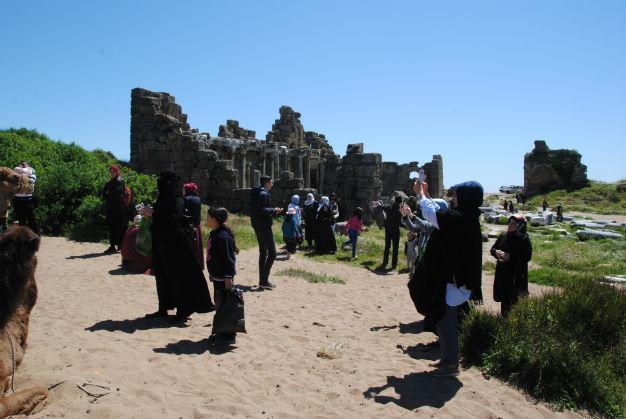Turkey mulls building ‘Arab village’ to woo tourists from Arab countries
Emine Kart - ANKARA

AA photo
In a bid to attract more visitors from Arab countries, Turkey is considering establishing an “Arab village,” an idea floated by the head of the Jeddah-based Arab Tourism Organization (ATO) during a recent visit to Saudi Arabia by Foreign Minister Mevlüt Çavuşoğlu.
While in Riyadh for a conference held on April 24, Çavuşoğlu met with his Saudi counterpart Foreign Minister Adel bin Ahmed al-Jubair and was also received by Saudi King Salman, Foreign Ministry spokesperson Tanju Bilgiç stated on May 9.
Before proceeding to Riyadh, Çavuşoğlu also had a meeting with Bandar bin Fahad al-Fahaid, the president of ATO, an affiliate of the Arab League, in Jeddah on April 23.
“During this meeting, various ideas, especially the signing of an agreement between the Arab Tourism Organization and Turkey, the arranging of an ‘Arab-Turkish Tourism Security Conference,’ and the founding of an ‘Arab village’ were addressed,” Bilgiç told reporters.
“The head of the ATO particularly floated the idea of establishing an Arab village in order to further revitalize tourism relations between Arab countries and Turkey,” he added.
“We know that the president of the ATO also visited Turkey later,” Bilgiç said, in an apparent reference to al-Fahaid’s participation in the international Halal Tourism Conference 2016 held in the Central Anatolian province of Konya last week.
“[At the conference] meetings on this issue were held again based on the proposal of the ATO. In other words, the main goal is to increase the number of tourists coming from Arab countries to Turkey and strengthen our tourism relations,” Bilgiç also added.
Turkey’s tourism sector has suffered a dramatic decline in recent months, amid a string of diplomatic and security issues.
The country’s tourism revenue fell by 16.5 percent in the first quarter of this year compared to the same period of 2015, amid repercussions of the refugee crisis, bilateral tension with Russia, and a series of bomb attacks by both the Islamic State of Iraq and the Levant (ISIL) and militants of the outlawed Kurdistan Workers’ Party (PKK).
In early April, as he hosted Iranian Communications and Information Technology Minister Mahmoud Vaizi, Minister Çavuşoğlu sought to increase the number of Iranian tourists by proposing to have more flights scheduled between Iran and Turkey. He also said he would seek to have Iranian airline companies permitted to fly to various new points in Turkey.
